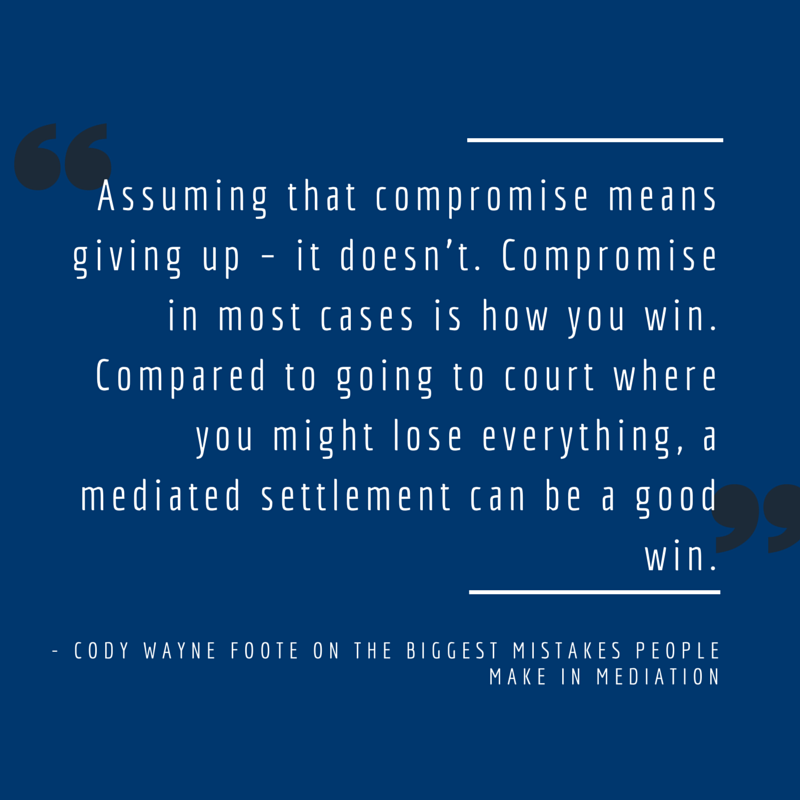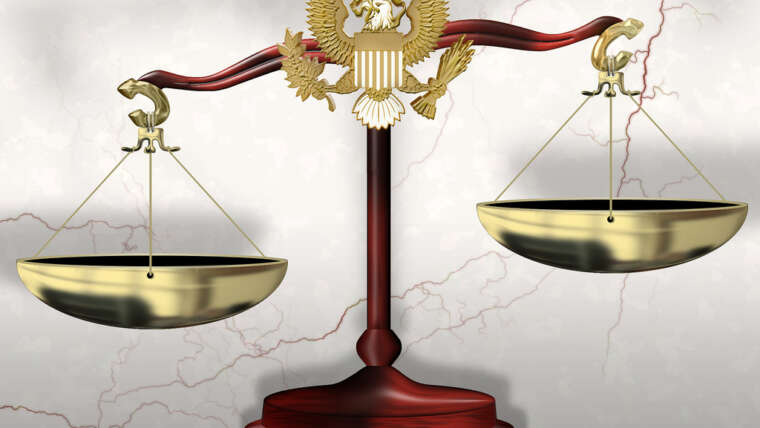Since 1979 Cody Wayne Foote has been active in the legal world as an attorney and now most recently, as a mediator. Located at 217 S 8th Street in downtown Opelika, the Law and Mediation Center serves a variety of cases each day from divorce proceedings to property disputes. Katie Crow Law had the opportunity to sit down with Mr. Foote to learn about his experience with mediation. Here is what he had to say:
Q: In your own words, what is mediation?
A: Mediation is an alternative way to settle disputes outside of court.
Q: How does it differ from arbitration?
A: In its simplest analysis, mediation is an agreement that you get between the two parties to settle their dispute. The mediator just helps facilitate.
Q: Why would someone choose mediation over going to court?
A: The thing is this, what do people fear the most in life? It’s not death and it’s not divorce although those are very high. It is the unknown. If you don’t settle in mediation – where do you go? Court. When you go to court – what do you do? You roll the dice. Nobody knows what the Judge will decide. However, if you work out a mediated settlement, you know exactly what you have. You know what you worked out. It’s your settlement. If you can live with that – isn’t that a little better than the unknown of court? Where you may get nothing or something you don’t even want?
Q: Would you recommend that mediation is better for most cases?
A: There is nothing magic about mediation. It’s just about following a set of rules that [customers] can live with. In order to meet an agreement, two parties need to reach a compromise in some way. Compromise is how civilized people solve their problems and mediation is just another form of compromise. It depends on the type of person you are and the support you need whether mediation is the right source of compromise for you.
Q: What is the golden key of mediation?
A: It’s different for every case. Sometimes it’s giving up a personal item that doesn’t mean that much to one person but they know it matters to the ex so they hold out because they feel they have been mistreated and this is how they get back at them. The problem is, the whole process is held up because of emotions. That is when I might split up the clients and hopefully get everyone to be reasonable in one-way or another. It’s not always easy, but a good mediator needs to find that golden key that unlocks the case and keeps it moving forward despite emotional constraints.
Q: Can you tell me an example of some type of mediation that you would see?
A: Say for example some relatives inherited some land, brothers and sisters. They own the land in an estate and they don’t want to go court and argue over it. They want to get somebody to sit down and help them figure out how to either divide the land or sell the land and divide the money. That would be a way that you could mediate a case without having to take it to court.

Q: Why should someone use mediation as a means to settle a divorce?
A: In mediation you can listen to hearsay. People can stop and cry or they can discuss personal matters with you. They can do whatever makes them feel comfortable and gets their message out.
Q: What are the most common misconceptions about mediation?
- That I am a Judge and I am going to rule one way or another and that is not my job. I am a neutral third party.
- If they do reach this agreement and it is filed with a court and the other party doesn’t live up to it – that they call me and I would be the one to call the other party and fix the situation. Once they sign the agreement, my job is done and it is the court’s job to enforce the arrangements that were made. If one party isn’t living up to their end, you may want to look into a Rule Nisi petition to find them in contempt of court.
Q: Do you believe mediation is a good option for people with children?
A: In almost all cases, yes. There are some cases where the parents may not be making the best decisions and a Judge needs to be there to work in the best interest of the child. Outside of that scenario, a mediated settlement is almost always better for a family.
Q: Do you have any advice on how to prepare for a mediation hearing?
A: Get all your information in order. You should have all the necessary documents in writing and not just in your head. If it’s a divorce mediation, find out the mortgage payments, find out the monthly payments that you and your spouse pay, know how much you have in the bank, how much is in savings, all information regarding retirement plans, daycare costs, cost of insurance programs, any special needs of the children like braces or tutoring costs, etc. Have all information ready and accurate in order to make the most of your time and money.
Q: What are the biggest mistakes that people make during mediation?
A: Assuming that compromise means giving up – it doesn’t. Compromise in most cases is how you win. Compared to going to court where you might lose everything. A mediated settlement can be a good win and negotiating each step of the way is just as important as having an overall mediated settlement because that’s how you get there. Some people come in and decide they wont agree to anything. In that case the mediation isn’t going to work. Come in with an open mind and ready to compromise because that is how you win.
Q: What are some things clients should look for when selecting the right mediator for their case?
A: First, you need to select the right lawyer. Some lawyers hate mediation and only come here because a judge has ordered them to. They won’t contribute and it’s a waste of time for everyone involved. What the lawyer wants is to go to court and rack up the billing hours rather than settle in mediation. So, pick a lawyer that is open to mediation. Then pick a mediator that has availability to hear your case and that both parties can agree on.
Q: Is it possible to switch halfway through mediation and take the case to court?
A: Anybody can call a halt to the mediation process at any time. Even I can call a halt to it if I want, but I usually don’t. I have found that in most cases, just as you are about to give up is when you are about to make a breakthrough.
Q: How do you keep everyone calm during a particularly heated discussion?
A: Emotion. You have to be empathetic to people’s emotions in mediation. You have to devote your time to the party that needs it the most. Find the golden key.
Figure it like a circle. Inside the circle is emotion. I could offer you the world on a silver platter and it would not be enough because what you really want is a pound of flesh. You’re never going to get it, but that is what you want. So you keep saying no I want this and I want this. When you get it, suddenly you want something else. So what you do [as a mediator] is let them run the gamut of their emotions and you push them to get it out. Say what they have on their mind and get it all out. Once they do, then you get to the inner circle, which is where the facts are. You had to go through the big emotional circle to get to the little circle of facts, but once you do – that is when you can start getting somewhere in negotiations. Once we get through all that, we are down to money, land, and buildings.
Q: Have you ever had a customer who was impossible to work with, if so, what did you do?
A: Sometimes I will appeal to the lawyer. A lot of the times the lawyer will understand the needs of their client better and will help you out. Sometimes I have to sit down with one party separately and let them know that they are being unreasonable and they need to compromise on something if they want to finish this.
Q: Can you tell me about the easiest case you had and why it was so successful?
A: Sometimes customers will come in who have worked everything out they just don’t know how to put it into words. They need your help to write up a settlement and have it approved by a judge. Those are my easiest cases.
Q: Have you had any memorable experiences over your career?
A: There was a wife who had felt like her husband didn’t care anything about her. For some reason or other she had had that in her head the whole marriage. The husband had been trying for years to do little things for her but it didn’t work. During the course of the mediation she was brought face to face with all that he had said and all that he had done. Right as we were finishing up, something clicked for her. She said, “I don’t know what I’ve been thinking. I’ve been totally blind this entire marriage. We’re going to get a divorce and I’m going to be divorcing the one person who has cared the most for me in my entire life.”
You will find other things [like that] where people will be awaken during the mediation process. People will see things that they’ve been ignoring for years and it is finally brought home to them at some point in the process. [Mediation] will help you see in yourself. It will help you understand yourself like you’ve never seen yourself before.
Q: Any last pieces of advice?
A: Every step of the way you learn to give and take. Once you do all of that, you will end up with an agreement that you have put your life into, so why wouldn’t you want to live up to it? Why wouldn’t you want to make it a good one?
Disclaimer: The examples used in this work are made up by Mr. Foote. Any resemblance to a real case or person, living or dead, is purely coincidental.
Mr. Foote can be reached at (334) 749-2686 or you can visit the Law and Mediation Center at 217 S 8th St in downtown Opelika. If you’re looking for a lawyer that has experience with mediation, call Katie to request a free consultation. To learn more about mediation and why it might be a good choice for you, click here.
 Katie Crow is a family law and divorce attorney located in Opelika, Alabama. Katie also practices in the surrounding areas of Auburn in Lee County, Chambers, Macon, Russell, and Tallapoosa counties in Alabama striving to help her clients with their legal needs. Katie specializes in areas concerning divorce, child custody and parental rights, adoption, modifications, child support, paternity, and other legal services.
Katie Crow is a family law and divorce attorney located in Opelika, Alabama. Katie also practices in the surrounding areas of Auburn in Lee County, Chambers, Macon, Russell, and Tallapoosa counties in Alabama striving to help her clients with their legal needs. Katie specializes in areas concerning divorce, child custody and parental rights, adoption, modifications, child support, paternity, and other legal services.
[button id=”” style=”border” class=”” align=”center” link=”https://dev.katiecrowlaw.com/staging/contact/” linkTarget=”_self” bgColor=”accent1″ hover_color=”accent1″ font=”16″ icon=”theme-bubbles” icon_placement=”left” icon_color=”accent1″]REQUEST A FREE CONSULTATION →[/button]No representation is made that the quality of the legal services to be performed is greater than the quality of legal services performed by other lawyers.


